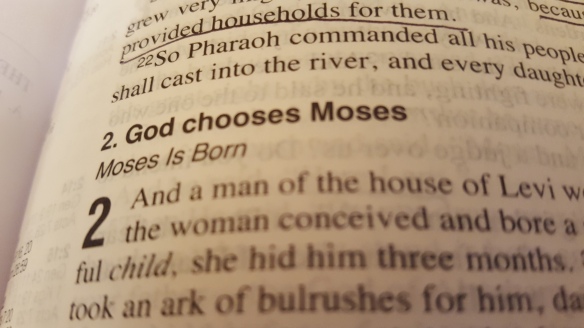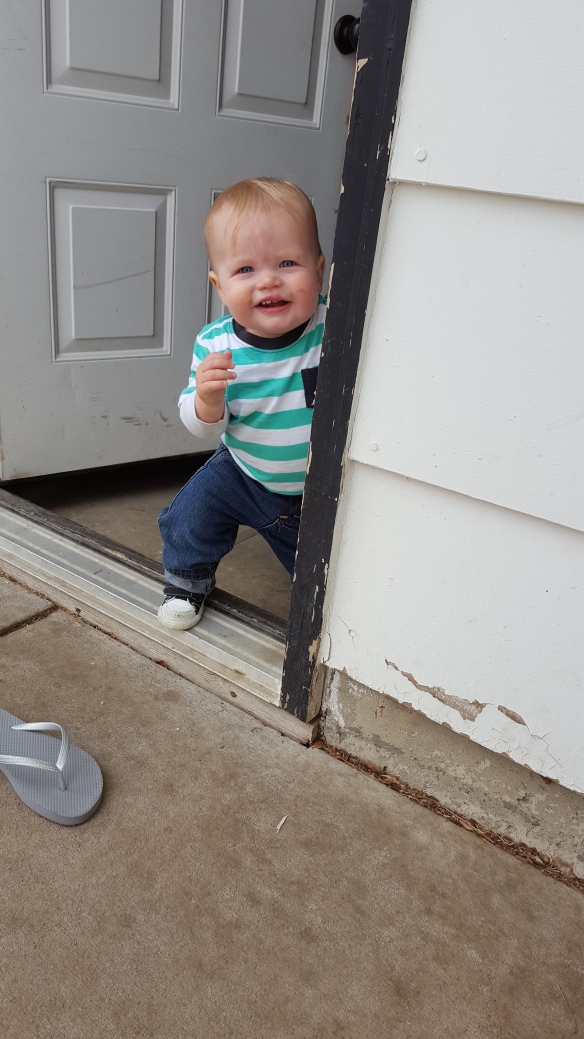I have recently been doing a devotional on Moses, and I gotta tell ya, I feel for the guy. Picture this for me: You’ve got a guy, around eighty years old (relatively young in Biblical terms), hanging out with his wife’s family, shepherding for his father-in-law. He has had it pretty rough, being driven from his homeland after killing a guy, after all, but he is mostly satisfied to live out the rest of his days working for his father-in-law. Little does he know, God has a much different plan in mind. Little does he know, a mundane day in a field with a flock of sheep, would be the last mundane day he’d ever experience.

I commiserate with Moses in a lot of ways. God asked him to do the impossible, and he wasn’t lacking in his doubts. That’s what I love about him. He doubted God just as much as I tend to doubt Him. Moses was told in Exodus 3:10, “So now, go. I am sending you to Pharaoh to bring my people the Israelites out of Egypt.” Now, if I had been in Moses’ shoes, I would have replied, “Excuse me, what?” For an ordinary man like Moses, this is quite the command, so Moses responds how we would expect, “Who am I that I should go to Pharaoh and bring the Israelites out of Egypt?”
It is pivotal that each of us pay very close attention to the way that God responds to this question. God says, among other things, “I will be with you…” Uffda. That is some good stuff. I will be with you. I will be with you. I will be with you.
Just as this is rarely enough for me, it certainly isn’t enough for Moses either. Moses continues to ask God countless questions for even more reassurance; so many in fact that God becomes angry with him. The important part of the story, however, is that he goes. He takes up his cross and follows God, dead set on doing the impossible, despite his doubts and his fears.
Once arriving in Egypt, one might assume that since God sent him, everything went smoothly for Moses. However, this assumption could not be further from the truth. Moses and Aaron face countless difficulties and failures on their journey to free the Israelites. After Moses politely asks the king of Egypt to free God’s people, Pharaoh becomes angrier with the Israelites and makes their lives as slaves even more unbearable. This causes the Israelites to doubt Moses and Aaron, begging them to stop making things worse.
This is when Moses turns to God in Exodus 5, asking, “Why, Lord, why have you brought trouble on this people? Is this why you sent me? Ever since I went to Pharaoh to speak in your name, he has brought trouble on this people, and you have not rescued your people at all.”
Aaah… There it is. Here, Moses demonstrates a dangerous, yet common human weakness. It is the weakness that causes us to trust God up to a certain point, but then, when He does not carry out His plan the way we think He should, we turn against Him. I do it. You do it. We all do it.

Moses was called to be the leader of a distressed group of people for 40 years. He was a simple shepherd. He was not fluent in speech, and he certainly didn’t have an out-of-this-world faith in God. He was an ordinary man asked to do an extraordinary thing.
If I could hop up to heaven for just a few minutes, I would chat with my Grandma, but I would also give Moses the biggest high-five, like ever. Why? Because he served his heavenly father despite intense opposition and fear. Moses continually doubted that God had chosen the right person for this improbable task. The number of times Moses turned to God and asked, “Are you sure you have the right guy?” is recorded only twice in the Bible (I think). However, for forty years he was the leader of a group of people with extremely fickle faith. It is quite possible that Moses asked the Lord this question at least once a day for forty years. He had his doubts — there’s no question.

I have my doubts too. God has called me to do something impossible too–impossible for me anyway. He called me to be a stay-at-home mom, and I have just got to say, this is a relatively impractical request for my people-loving, activity-seeking, loquacious personality. While my husband works a 12 hour day and my son plays happily or naps quietly, I often become nearly consumed by the silence of my house. I ache for people, laughter, busyness, conversation, and (dare I say) purpose.
I realize that there is a part of myself that will never be satisfied as a stay-at-home mom, the people-loving part. At times, this causes me to ask, “God, are you sure you have the right girl?” I tend to doubt that my Father called me to do this for Him. I doubt that He has a plan greater than my boredom, greater than my restlessness. This is when I mirror Moses and ask with frustration and sometimes contempt, “Who am I that I should only have one purpose, to raise my family, while the rest of the world is out having a life?” This is a question the devil breathes into me.
Uffda. How’s that for honesty? Now, don’t get me wrong. There are certainly many days that I can hardly contain my immense joy because I get to watch my son grow, missing nothing of his childhood. However… there are also days that I look to God and wonder why this is His call for me. In a world that emphasizes money, busyness, big houses, and success, while de-emphasizing family focused living, I often feel as though I stand alone, me, the girl who hates being alone and always has.
When I don’t think I can handle another day of just mothering, this is when God finally speaks to me and He says, “I will be with you. I will be with you. I will be with you.” Like Moses, there are days that this will be enough and there are days that I continue to seek more answers. There is one thing, however, that I can say without question, even on my bad days: My Father called me to this and I will do my best for Him.
Thank you, Moses.


Not always easy, but ALWAYS worth it. 🙂 I would chat with Grandma too. Then I would look up Ruth and Esther. 🙂
LikeLiked by 1 person
You are so good at saying what I can only think about. Thanks for putting your words on paper. This study on Moses has touched me as well!
LikeLiked by 1 person
Love this!
LikeLiked by 1 person
What a great parallel, questioning God as Moses did, “Are you sure you have the right one?” Then resting as much as humanly possible in knowing that we are not doing the task, but letting God do it through us. I know, I never conceived that I would be a stay-at-home mother at any time in my life, but surrendering to God has filled my life with compiling surprises and gifts. I can’t get over how cute your little boy is, by the way.
LikeLiked by 1 person
It is so funny the plans that we make versus the plans the Lord has for us. Thanks so much. I think he’s pretty cute too 😉 When will your new little one be arriving?
LikeLike
Due in four and a half weeks but since our first was 15 days past due date, I’m thinking he/she will arrive in June:)
LikeLiked by 1 person
Uffda. Long wait. Congratulations!!
LikeLike
I’ve been where you are and I remember that feeling of loneliness and purposelessness. It will get better! I promise. Keep up the good work.
LikeLiked by 1 person
Thanks so much!!
LikeLike
Great article! The story of Moses definitely hits home because he was not perfect. If anything, God had to place Aaron to speak on his behalf because of his insecurity with stuttering. I will share some insight I learned in Exodus class that I think you may find it useful and perhaps even see the passage in a different light.
When Moses first appears before the Pharaoh, you will actually see that he did not ask politely. Here is why. In Exodus 3:18, this is what God instructs Moses to say to the Pharaoh initially: “… you and the elders of Israel shall go to the king of Egypt and say to him, ‘The LORD, the God of Hebrews, has met with us; and now, PLEASE let us go a three days’ journey into the wilderness, that we may sacrifice to the LORD our God.” However, this is what actually happens: “Afterward Moses and Aaron went and said to Pharaoh, ‘Thus says the LORD, let my people go, that they may hold a feast to me in the wilderness'” (Exo. 5:1).
There are three major differences between what God instructed Moses to do and say and what Moses actually did. First, Moses was to take elders of Israel with him. Yet he only took Aaron. Second, God explains who he is – “God of Hebrews… LORD our God.” This was crucial component to the plea. When Moses fails to mention this component, Pharaoh is confused – “Who is the LORD, that I should obey his voice and let Israel go? I do not know the LORD, and moreover, I will not let Israel go” (Exo. 5:2). Third, God’s instruction was more peaceful and diplomatic – “Please let us go…” But Moses comes out guns blazing by saying “Thus says the LORD, let my people go.”
It is only when the Pharaoh response unfavorably and unexpectedly, Moses reverts to what God commanded him to say (v. 3). But they also add one thing God did not command them to say, “lest he fall upon us with pestilence or with the sword” (v. 3). But if we go back a chapter, God also gave Moses what to say in response to Pharaoh’s objection, “But I will harden his heart, so that he will not let my people go. Then you shall say to Pharaoh, ‘Thus says the LORD, Israel is my firstborn son, and I say to you, “Let my son go that he may serve me.” If you refuse to let him go, behold, I will kill your firstborn son.'” Moses literally had it all backwards.
This could very well be the reason why people of Israel faced the consequences of having to make bricks without straw. But this taught Moses earlier on the importance obeying God’s command to exact detail because he was called to be like God to Pharaoh (Exo. 7:1). He was the face of Yahweh. It was crucial that Moses did not falsely represent God. And we know later than when Moses fails to represent God properly to Israel, he is kept from going into the promised land.
Moses too, like any of us, had his moments where he failed to obey God. He had his moments of fear. He had his moments of anger. Yet we remember Moses to be one of the most faithful servants to have ever served God and also a great leader. Despite his trial and error, Moses in every sense, was the right guy God called for the job. He went from fearing God to speaking with Him face to face like a friend would and even turning His anger from destroying Israel. God had called him and molded him into the leader He needed him to be. I think most often our insecurity is that we fall short of the calling God has for our lives. And most often we do. But if God can shape a murderer and a stutterer into a leader for God’s people, perhaps nothing is indeed impossible with God.
I hope that helps! I know that was long so thanks for reading! Keep up the good work! A mother is a heavy yet important calling!
LikeLiked by 1 person
That was so interesting!!! Thanks a ton for sharing!! I would have never noticed Moses’ failure to follow God’s instructions. That is an interesting turn of events!
LikeLiked by 1 person
You’re welcome! I did not realize that until I took the class haha But definitely helped me look at the passage in a different light for sure.
LikeLiked by 1 person